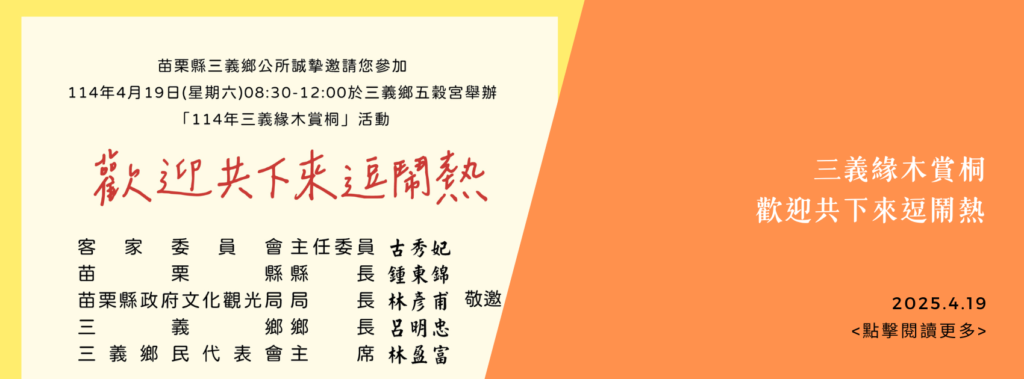
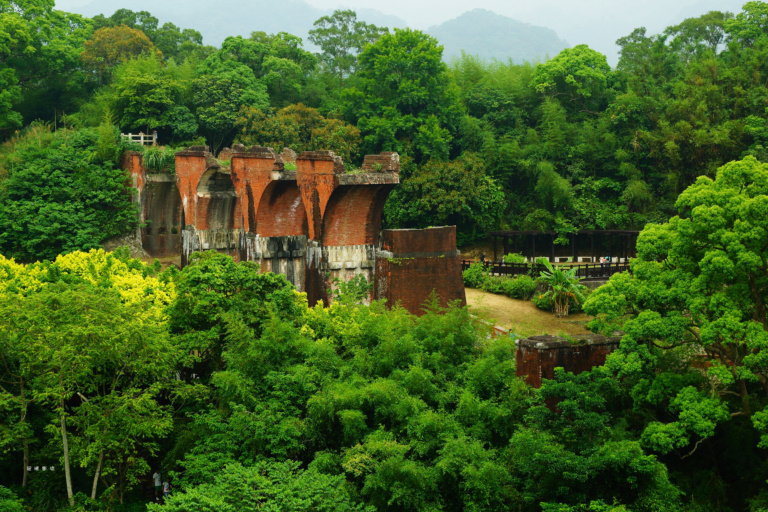
Sanyi Township is located at the southern end of Miaoli County. Due to its geographical features, the area is often shrouded in mist, earning it the nicknames “Foggy Town” and “Woodcarving Capital.” Sanyi boasts rich tourism resources, blending the beauty of nature, culture, local industry, and railway heritage. The Old Mountain Line area offers stunning forest scenery and is surrounded by well-known attractions such as Shengxing Station and the Longteng Broken Bridge. During April and May, the hills are blanketed with blooming tung flowers, creating a mesmerizing landscape that draws many visitors.
In recent years, the township has focused on a development philosophy centered around “slowness,” promoting the three pillars of “slow food,” “slow travel,” and “slow living” to shape an urban lifestyle defined by a slower pace. In 2016, Sanyi was recognized as one of Taiwan’s four certified Cittaslow towns at the International Cittaslow Assembly. It stands out as a unique township that not only holds the distinction of a classic small town but also enjoys international Cittaslow certification, making it both a tourism hotspot and a model for sustainable living.
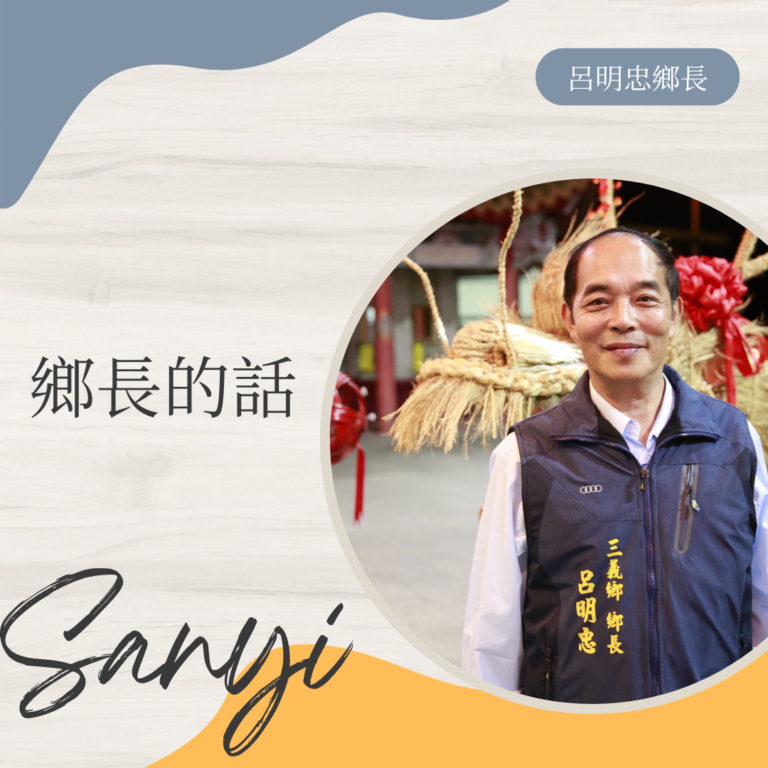
Hello everyone, I am Lü Ming-Chung, the Township Mayor of Sanyi in Miaoli County and also the Chairman of the Cittaslow Taiwan Alliance.
Sanyi Township is a charming and iconic small town in Taiwan, renowned for its woodcarving art and known as the “Hometown of Woodcarving.” It boasts a rich tradition of woodcarving craftsmanship.
Since 2001, Sanyi has hosted the annual Woodcarving Art Festival. This vibrant and art-filled event attracts woodcarving enthusiasts and artists from across Taiwan. Woodcarving here is not only an artistic expression but also a cultural symbol of the local community.
Sanyi is also nicknamed the “Foggy Town of Taiwan” due to its unique geographical location, which often results in thick winter fogs. This misty atmosphere adds a mystical charm and distinctive ambiance to the area’s tourist attractions.
In 2016, Sanyi was honored with the designation of an “International Cittaslow.” Under the Cittaslow philosophy, the township promotes the pillars of “slow food, slow travel, and slow living,” shaping a lifestyle that embraces a slower pace. This dual recognition makes Sanyi both a classic small town and an internationally certified Cittaslow community.
Sanyi offers a wealth of tourism resources, blending the beauty of nature, culture, local industry, and railway heritage. The Old Mountain Line area features stunning forest landscapes and is home to well-known attractions like Shengxing Station and Longteng Broken Bridge. Visitors can enjoy the blooming tung flowers in April and May, and admire rapeseed and firecracker flowers during the Lunar New Year season. Through food, leisure, and activities, travelers can immerse themselves in the cultural and daily life of Sanyi.
We warmly welcome everyone to visit Sanyi, experience the richness of Hakka culture, and fall in love with this beautiful town through sharing, conversation, and hands-on exploration.

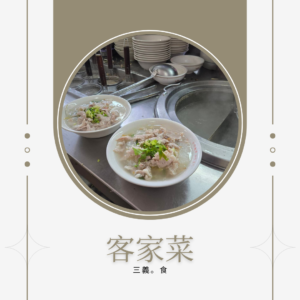
Hakka cuisine
When visiting Sanyi, you definitely shouldn’t miss out on its rich and diverse Hakka cuisine! In the past, due to limited resources and a tough life, Hakka ancestors had to endure hard labor to cultivate the land. To replenish energy and salt lost through sweat, and to enhance appetite with simple ingredients, traditional Hakka dishes are characterized by being oily, salty, and aromatic.
To suit modern tastes and respond to today’s preference for lighter, healthier meals, contemporary Hakka cuisine is no longer overly heavy. With creative and refined cooking techniques, Sanyi’s Hakka food has become an appealing travel theme in itself. Many famous Hakka restaurants are packed with diners on weekends—reservations are a must!
For a quick taste of Hakka flavor, several noodle shops in town offer simple yet satisfying options like flat rice noodles (bantiao), soups, and various noodle dishes—hearty portions at a very affordable price.
Rice is a staple in Hakka culture, and “ban” (粄)—a traditional rice-based snack—is essential during holidays and ancestral rituals. Many shops have created new flavors and smaller portions of these traditional Hakka rice cakes, with cute packaging that makes them perfect for tasting or gifting.
Another Hakka specialty is Lei Cha (擂茶), a signature drink made by grinding a mix of grains and tea leaves in a mortar and brewing it as a beverage. Making Lei Cha is a fun, hands-on experience that both kids and adults can enjoy—it’s a great way to connect with Hakka tradition through taste and activity.
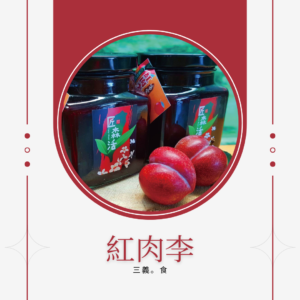
Red-fleshed plum
Farms in the Shuangtan Leisure Agricultural Area of Sanyi Township benefit from a unique terrain that is often shrouded in mist year-round and marked by noticeable climate variations. These ideal natural conditions allow peaches and plums to thrive, resulting in especially sweet and flavorful fruit with high yields. Among them, the red-fleshed plum stands out—rich in flavor, juicy, and grown in a pristine, toxin-free environment.
These plums, known for their perfect balance of sweet and tart flavors and their plump, juicy flesh, enter peak harvest season in May. Visitors are warmly invited to come and experience fruit picking and hands-on DIY jam-making—a fun and engaging way to enjoy the freshness of the season!

Tungkan tangerine
Fujin Farm, located in the Shuangtan Leisure Agricultural Area, benefits from the unique climate and terrain, where the citrus fruits grow in a fog-covered mountainous area throughout the year. This special environment nurtures the sweet and tangy, juicy, and aromatic seedless Tungkan tangerines, with a rich flavor. The farm follows natural and friendly farming practices, presenting the best quality seedless Tungkan tangerines to its customers.
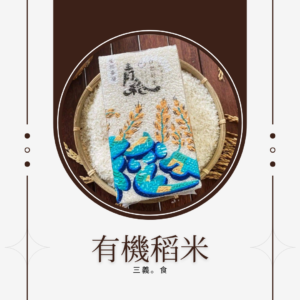
Organic Rice
The variety is 71 Fragrant Rice, available in both white and brown rice options, produced in the Liyu Community of Sanyi Township, Miaoli County. It is made by “Qingdao Fu Agricultural Products Studio,” a brand built around three key elements: youth, rice fields, and farmers. The brand focuses on friendly farming practices and ecological sustainability as its core principles.
| 推薦餐廳 | 店家電話 |
|---|---|
| 吉祥樓餐廳 | 037-875923 |
| 勝興客棧 | 037-873883 |
| 漫步雲端森林廚房 | 037-879085 |
| 金榜麵店 | 037-873567 |
| 賴新魁麵館 | 037-872600 |
| 彩雲麵食 | 0970-842989 |
| 三義鄉村小吃 | 037-873450 |
| 目鏡麵食 | 0912-371616 |
| 阿達與阿貞麵館 | 037-875909 |
| 穎川美食館 | 037-876546 |
| 多倫多小館 | 037-874989 |
| 大眾庭園客家小館 | 037-879178 |
| 叁代堂 | 037-875070 |

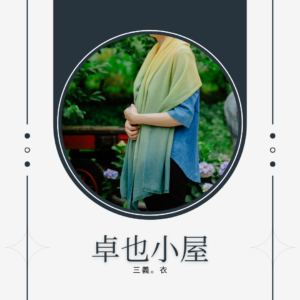
Zhuo Ye Cottage
Along Route 130, you can spot it before reaching halfway up the mountain. Once you enter the park, you’ll see large trees, wooden houses, barns, and leisurely ducks and geese, resembling a miniature version of an early rural village.
Inside the park, there is a sizable indigo dye workshop. The indigo dye here is made from homegrown indigo plants (Baphicacanthus cusia), with professional craftsmen guiding the process from harvesting the plants to extracting the dye. They create breathtaking works of art, such as indigo-dyed paintings, scarves, bags, and clothing. The beauty of these creations is internationally renowned.

旅館與渡假村 Hotel and Resort
| 推薦住宿 | 訂房電話 |
|---|---|
| 西湖渡假村 | 037-876699 |
| F Hotel | 037-878788 |
| 寶元紀三義 POUYUENJI HILLS |
民宿 Bed and Breakfast
| 推薦住宿 | 訂房電話 |
|---|---|
| 福田瓦舍 | 037-876156 |
| 柏竺山莊 | 0931-399089 |
| 卓也小屋 | 037-879198 |
| 樹也 | 037-881712 |
| 甘丹民宿 | 0978-275231 |
| 馨雅民宿 | 037-870551 |
| 向陽田園 | 037-874028 |
| 逸悅山悅 | 037-876397 |
| 峯州小木屋 | 037-876921 |
| 雲洞山莊 | 037-951536 |
| 黃石山莊 | 037-878502 |
| 五福山莊 | 037-872994 |
| 愛面子 | 037-875766 |
| 慕哲哈比屋 | 037-872935 |
| 炭鄉八八 | 0932-524719 |
| 薄霧館 | 0965-765910 |


Sanyi Railway Station
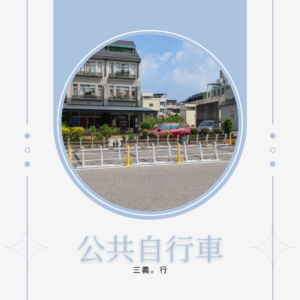
Public Bicycles
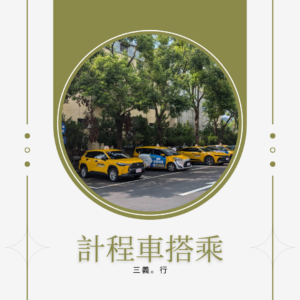
Taxi Ride

Motorcycle Rental


Promotion of Hakka Language

Food and Agriculture Education
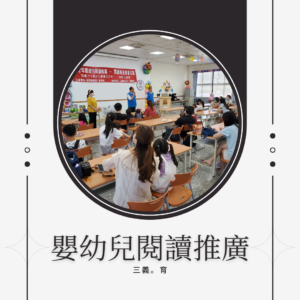
Infant and Toddler Reading Promotion

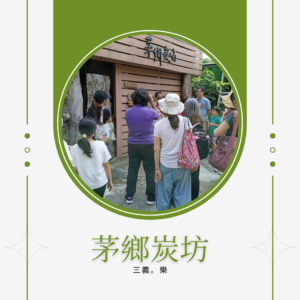
Maohsiang Charcoal Workshop
The western side of Provincial Highway 13 was once a remote area of Miaoli County, where residents made a living by extracting camphor oil and citronella oil. Today, the area has shifted its focus to showcasing the oil refining process and producing local charcoal. In the past, people would carry the refined products along ancient trails to sell at Sanyi Station, leaving behind scenic trails and traces of the old refining industry.
Located in Shuanghu Village, Sanyi Township, Maohsiang Charcoal Workshop is a family-run distillery passed down through four generations, specializing in citronella, camphor, and hinoki oil extraction. The current fourth-generation owner, Lo Wanzhen, revitalized the once-dormant factory, transforming it into a cultural tourism site. Through guided tours and demonstrations, visitors can learn about the rise and decline of Taiwan’s traditional oil refining industry. Lo Wanzhen notes that around the 1950s, Sanyi’s oil refining industry thrived, with citronella oil production ranking among the highest in the world.
To help visitors better understand citronella oil distillation, the workshop is equipped with complete facilities for processing citronella, camphor, and hinoki oils. Guests can watch the oil refining process, try their hand at wood-chopping and kiln firing, and purchase pure locally-made citronella oil, herbal liniments, and hinoki oil.
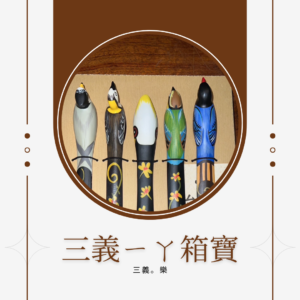
Sanyi Yaxiangbao (Sanyi Treasure Chest)
Sanyi is renowned across Taiwan and the world for its woodcarving industry, which has given rise to a unique cultural identity. In addition to the hundreds of art shops along Shuimei Woodcarving Street, visitors can explore the Woodcarving Museum showcasing works by renowned domestic and international artists, private collection museums, and hands-on woodcraft DIY experiences.
The 1970s marked the peak of Sanyi’s woodcarving boom. Shuangfeng Enterprise—the predecessor of “Sanyi Yaxiangbao (Sanyi Treasure Chest)”—produced wooden ducks used as decoys in duck hunting in Europe and America, making them a key export item at the time. Though the industry later declined, it saw a revival in 2002 with a successful transformation. The second-generation operator, Tang Yao-sheng, shares that the wooden ducks are lifelike, with graceful lines and appealing colors. The natural texture of the wood adds to their charm, making them a favorite among visitors.
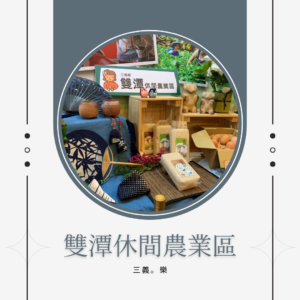
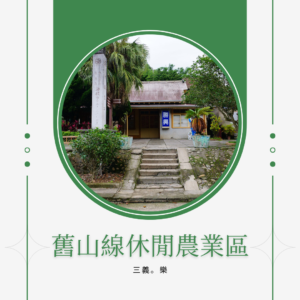
Leisure Agriculture Area
Due to its mountainous terrain and limited arable land, agriculture in Sanyi mainly consists of small-scale rice farming along with the cultivation of grains, tea, flowers, and fruits. However, Sanyi’s strong identity as a woodcarving hub has often overshadowed its agricultural side. With the growth of tourism, two Leisure Agriculture Areas have been officially established in the region, combining farming with tourism to attract visitors looking to experience rural life.
The Shuangtan Leisure Agriculture Area is spread along both sides of County Route 130. Heading east past the 700-meter-high Guandao Mountain leads to Dahu Township’s Ginger Garden Leisure Agriculture Area, forming a popular tourist route known as the “130 Line.” Shuangtan integrates agriculture with woodcarving, pottery, Hakka cuisine, unique homestays, and dining, making it an ideal destination for people of all ages to learn, explore, and relax.
The Old Mountain Line Leisure Agriculture Area centers around the historic Old Mountain Railway Line and expands outward to include Longteng and Shengxing villages. This area blends agriculture with the rich railway heritage and Hakka cultural elements, featuring a variety of Hakka dishes and locally produced specialty agricultural products. On weekends and holidays, it draws large crowds of tourists. With hands-on farming and gardening experiences and numerous homestays, it offers a comprehensive introduction to the charm of leisure agriculture.

Canaan Farm
Canaan Farm is a place built on love and dreams. Inspired by the female owner’s passion for healthful fruits and vegetables, the male owner transformed the land into a lush orchard. You’ll find treasures like the “Green Diamond” (amalaki), “Red Ruby” (roselle), “Oil Diamond” (sacha inchi), the owner’s favorite Arabica coffee, as well as lemons, Australian tea trees, and jabuticaba.
The garden also features blooming flowers throughout the year, including the “Dancing Lady” orchid that sways with the wind and the “Confederate Rose,” a hibiscus known for its color changes throughout the day.
One of the farm’s signature specialties is a dish of native chicken stewed with ripe coffee beans, offering a unique flavor reminiscent of the medicinal nandi root chicken soup — a delicacy cherished by food lovers.
Visitors can enjoy various hands-on experiences, including essential oil and hydrosol distillation, wood rose art installations, and DIY natural enzyme cleaners.
The farm also welcomes students with special needs for internship opportunities, helping them discover their passions through farm life. It is part of the international WWOOF network, offering a work exchange program for those interested in farming from around the world.
Though small in size, Canaan Farm is full of heart and offerings. In the near future, the farm will begin cultivating medicinal dendrobium orchids and promoting ways to enjoy this precious herb through food.
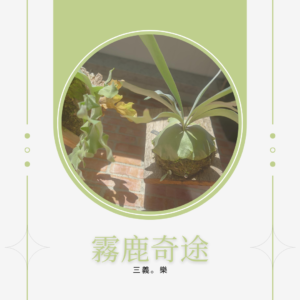
Wuluq Adventure
The brand “Wuluq Adventure” originated in 2023 from Sanyi Township, Miaoli. The brand’s identity is based on deer antler ferns and timber.
The site of Wuluq Adventure is a traditional three-sided courtyard house with retro bamboo-woven mud walls, situated in a forest-like natural environment. The space features 280 varieties of deer antler ferns and 70 types of flowers, plants, and trees. Additionally, the family’s past business in timber provides various unique woods and boards, allowing visitors to freely select and combine them with deer antler ferns to create their own “art pieces.” When feeling weary from the walk, visitors can rest in the cool, shaded main hall, enjoy a cup of tea, and admire the indoor plants and deer antler ferns under the light. You can also learn how to care for them. If you have any questions about deer antler ferns once you return home, feel free to consult us. We’ll help you become a green thumb!
The name “Wuluq” carries individual meanings for each character:
“Wu” represents the mist that often envelops Sanyi, giving it the title “Town of Mist.”
“Lu” symbolizes the 280 types of deer antler ferns planted in the courtyard, each exhibiting unique beauty.
“Qi” refers to the unusual, uniquely shaped woods from the family’s timber business, which, when combined with deer antler ferns, form distinctive art pieces.
“Tu” refers to the path or scope of things, extending to signify the intention of promoting the regional industry.

Yulon Motor Experience Center
What do you imagine when you think of car manufacturing? Located in Sanyi, Miaoli, the “Yulon Car Manufacturing Base” takes you on a journey to explore the true process of car production. Established in 1981, this factory is one of Yulon Group’s key manufacturing hubs, and since 2018, it has been open to the public, offering a unique industrial tourism experience for families.
The “Yulon Car Manufacturing Base” is the only open-to-public automotive manufacturing facility, attracting countless visitors both from Taiwan and abroad who are curious about the automotive industry. The entire tour is led by professional guides, and visitors are required to wear safety helmets and goggles. The experience allows you to get up close with the production line, feel the impact of stamping metal plates, witness the sparks from robotic welding, and understand the hard work of assembly professionals. Every detail reveals the journey of how a car is created from scratch.
Here, visitors get to experience the real production line. For safety reasons, all visitors, both adults and children, must wear closed-toe shoes, and the tour is conducted in groups following the guide’s instructions. Due to the nature of the factory environment, strollers and wheelchairs with auxiliary wheels cannot be used during the tour.
Yulon aims to educate and inspire visitors by showcasing Taiwan’s excellent craftsmanship and technology in car manufacturing, with an emphasis on the importance of factory safety, especially for children. The goal is to create an immersive, fun, and educational experience that sparks curiosity about industrial techniques and the automotive industry.
The “Yulon Car Manufacturing Base” not only provides an educational industrial tour, but it is also nestled in the natural surroundings of Sanyi’s mountainous area. The site is teeming with butterflies and Taiwan blue magpies, and the local Hakka cuisine and culture provide a perfect opportunity for parents to bring their children for a deep, immersive experience, learning and exploring together. It’s a chance to discover Taiwan’s automotive heritage and the beauty of Miaoli’s Sanyi region.

